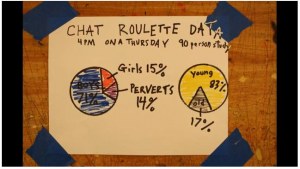When reading the comments on the Geek and Gamer girl video I noticed that there was quite some controversy, especially around the issue of geek women presenting themselves as sexy. Why is there criticism on sexy geeks?
I think it is clear to all kinds of groups that geek women do exist. In my opinion it is therefore obvious that they come in different identities, shapes, colours, sizes and sexual orientation. Of course they are not all as sexy as the girls in the geek and gamer video and this video is an aberration from the norm. But isn’t that the point of a parody?
I understand that female gamers take part in the geek culture because they enjoy it. I realize that they want to gain respect for their behaviour instead of being made into sexual objects. On the other hand, sexiness seems the way to get attention in this male dominated culture. Therefore, I think it is important to realise that this self-objectifying behaviour is performed for a reason. In my opinion this explains why the girls in the video are used as sexual objects.
Therefore, I don’t see this objectifying behaviour as anti-feminist, because it gets the conversation going. I think that team unicorn realizes that they have to work with the options that are available to them. I guess it might seem silly, but beauty and sexiness does provide females with power. This is shown in the male dominant culture like gaming, which females are able to enter based on this power.
Al in all, I think that feminist can use they sexuality as long as she strives towards a higher goal. She needs to keep in mind what it is meant for! And even though a lot of gamer girls disagree with the image team Unicorn is putting out there, I think it is very empowering for this group that this video let to a lot of controversy and started the discussion.
Internet Culture and Gender
This is a course in Women's Studies at Åbo Akademi University. The teacher of the course, Ann-Charlotte Palmgren, will post course information in the blog and students of the course will post blog entries about different aspects of internet culture and gender.
The aim of the course is to discuss and analyze internet culture, social media and gender from a feminist perspective. Through case studies the course examines how gender, sexuality, femininity and masculinity are constructed online (in for example blogs, Facebook, Second Life, massively multiplayer online games such as World of Warcraft, Twitter, Flickr, YouTube, hotornot.com, chat forums and online dating sites). Through these case studies, the course will reflect on how the construction of gender and sexuality is related to questions of normativity and power.
Search
Last blog comments
- apalmgre on Feminists fight against insulting trolls
- apalmgre on TheCHIVE
- apalmgre on Diablo III,is this just a gender RPG?
- apalmgre on Heteronormativity: Where you don’t even notice it.
- apalmgre on Gender differences on facebook behaviour?
- apalmgre on The Gender Ads Project
- apalmgre on Leftover Chinese women in youtube video
- apalmgre on Gender-swapping for beginners
- apalmgre on Gender portrayal in Gaming: Break.com versus Collegehumor.com
- mshewell on Heteronormativity: Where you don’t even notice it.
Archive
Categories
Meta


